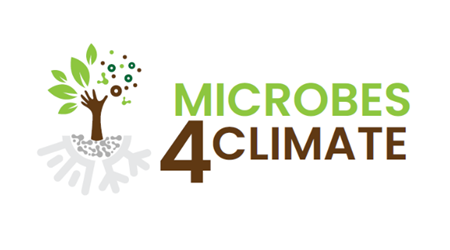Coordinated by
Coordinator:
UNIVERSIDADE DO MINHO, Portugal
Project partners:
- MICROBIAL RESOURCE RESEARCH INFRASTRUCTURE – EUROPEAN RESEARCH INFRASTRUCTURE CONSORTIUM (Coordinator), Portugal
- UNIVERSITAT DE VALENCIA, Spain
- UNIVERSITEIT GENT, Belgium
- ETHNIKO KAI KAPODISTRIAKO PANEPISTIMIO ATHINON, Greece
- UNIVERSITA DEGLI STUDI DI TORINO, Italy
- CONSIGLIO NAZIONALE DELLE RICERCHE, Italy
- INSTITUT NATIONAL DE RECHERCHE POUR L’AGRICULTURE, L’ALIMENTATION ET L’ENVIRONNEMENT, France
- ANALYSIS AND EXPERIMENTATION ON ECOSYSTEMS ERIC, France
- UNIVERSITE DE LIEGE, Belgium
- HELSINGIN YLIOPISTO, Finland
- UNIVERSITE DE RENNES, France
- LUONNONVARAKESKUS, Finland
- CENTRO INTERNAZIONALE DI ALTISTUDI AGRONOMICI MEDITERRANEI, Italy
- CENTRE NATIONAL DE LA RECHERCHE SCIENTIFIQUE CNRS, France
- INSTITUTE OF SOIL SCIENCE, AGRO-TECHNOLOGY AND PLANT PROTECTION NIKOLA POUSHKAROV, Bulgaria
- FORSCHUNGSZENTRUM JULICH GMBH, Germany
- AGENZIA LUCANA DI SVILUPPO E DI INNOVAZIONE IN AGRICOLTURA, Italy
- HELMHOLTZ ZENTRUM MUENCHEN DEUTSCHES FORSCHUNGSZENTRUM FUER GESUNDHEIT UND UMWELT GMBH, Germany
- LEIBNIZ – INSTITUT FUER PFLANZENGENETIK UND KULTURPFLANZENFORSCHUNG, Germany
- THE UNIVERSITY OF NOTTINGHAM, United Kingdom
- WAGENINGEN UNIVERSITY, Netherlands
- UNIVERSITEIT UTRECHT, Netherlands
- FONDAZIONE EDMUND MACH, Italy
- CONSIGLIO PER LA RICERCA IN AGRICOLTURA E L’ANALISI DELL’ECONOMIA AGRARIA, Italy
- E-SCIENCE EUROPEAN INFRASTRUCTURE FOR BIODIVERSITY AND ECOSYSTEM RESEARCH, Spain
- CAB INTERNATIONAL, United Kingdom
- INTERNATIONAL ALLIANCE FOR PHYTOBIOMES RESEARCH, INC, United States
- AIT AUSTRIAN INSTITUTE OF TECHNOLOGY GMBH, Austria
- SOCIEDADE PORTUGUESA DE INOVACAO CONSULTADORIA EMPRESARIAL E FOMENTO DA INOVACAO SA, Portugal
- UNIVERSIDADE DO MINHO, Portugal
- SIB SWISS INSTITUTE OF BIOINFORMATICS, Switzerland
Project description
(EU HORIZON) The project MICROBES-4-CLIMATE will provide a wider community of users/researchers, irrespective of location, efficient access to a cluster of complementary world-class Research Infrastructures and their integrated, advanced services along with training and scientific and/or technical support, to address such need. An excellence-driven programme of Transnational Access, which is at the core of the project, will enable users to conduct curiosity-driven research addressing terrestrial biodiversity and ecosystems, in light of the abovementioned multidimensional and still poorly understood microbiomes-plants-soil-environment interactions, and its roles in CG responses, resilience, and mitigation. This will foster the advancement of frontier knowledge and also pave the way to applied research on harnessing plant-microbiome interactions to improve the climate resiliency of plants/crops and to enable e.g., precision, sustainable and resilient agriculture.
Extended description
Terrestrial biodiversity and ecosystems are being challenged by global changes, and threats to agricultural and forestry ecosystems represent some of the most serious environmental and socio-economic menaces that the planet and humanity are facing. Climate change (CG) is widely recognised as one of the most impactful global changes, and since it goes hand-by-hand with biodiversity and services loss in terrestrial ecosystems, they should be tackled together. Microbes constitute the life support system of the biosphere, but they are its most overlooked fraction and are not considered in the context of CG. The overall understanding of the impact of CG on the assembly and functions of microbiomes is still very limited. How the complex microbes-plants-soil interactions and its consequences on plant performance and productivity are impacted by CG is still largely unknown. Additional knowledge also needs to be obtained on the overall ecosystem functioning, and to what extent microbiomes may mitigate stress conditions due to CG.
FEM activity: Comparison of the effects of different types of soil microbiota on the performance of different plant cultivars, genotypes (genome-edited/transgenic lines), ecotypes or species in terms of plant growth, health and water/nutritional status. The interaction in the soil/microbiota/plant system can be explored using different combinations of soil types, microbiota (natural or artificially constructed and inoculated), fertilization, water availability and other environmental conditions.



